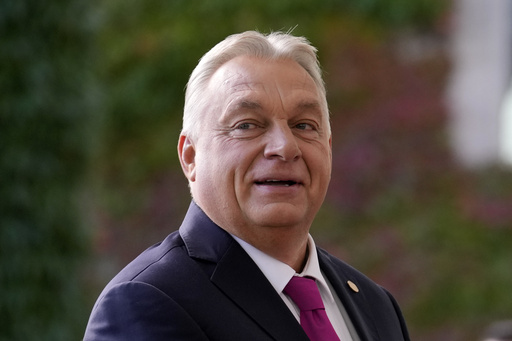
BUDAPEST, Hungary — On Friday, Hungarian Prime Minister Viktor Orbán alleged that the Polish government, along with Prime Minister Donald Tusk, was placed in power by the European Union as part of a broader agenda to eliminate the previous right-wing populist administration. Orbán did not provide any supporting evidence for his accusations regarding the Polish government, which was elected in 2023 with a notable voter turnout of approximately 74%.
These statements were made shortly after Orbán, known for his nationalistic viewpoints, addressed his supporters and claimed that the EU is attempting to overthrow his government and replace it with a puppet regime in Hungary. In a conversation on state radio, he specifically criticized EU Commission President Ursula von der Leyen and Manfred Weber, the head of the European People’s Party, accusing them of plotting to usurp his administration similar to what he alleges occurred in Poland during the 2023 national elections when Tusk’s coalition outperformed the ruling Law and Justice party.
“It’s not even a secret conspiracy against Hungary, it is an openly represented, announced plan,” Orbán remarked regarding this alleged conspiracy, though he failed to provide evidence for his claims. He noted, “The same thing happened in Poland. The Poles also went their own way, they also took an independent Polish policy on migration, gender, and the economy.” He asserted that both von der Leyen and Weber have publicly stated their intentions to replace the conservative Polish government, paving the way for Tusk’s rise to power—a situation Orbán contends is being replicated in Hungary.
Orbán has a history of contentious relations with the EU, which has withheld substantial financial aid from Hungary due to concerns over the country’s adherence to democratic principles and the rule of law. The prior Polish government, known for its nationalist-conservative stance, also faced conflicts with the EU regarding similar issues. In reaction to these tensions, Orbán has adopted a more confrontational stance toward the EU since Hungary’s accession to the bloc in 2004, working to unite euro-skeptic factions within the European Parliament to form a significant far-right political alliance. Additionally, he has steered Hungary closer to authoritarian regimes like Russia and China, seeking external investments and loans as EU financial support dwindles due to his government’s actions.
Tusk’s administration is actively working to reinstate Poland’s democratic structures that he believes were undermined by the previous government aligned with Orbán, while still holding onto some conservative policies, particularly regarding illegal immigration. Looking ahead to national elections scheduled for early 2026, Orbán drew parallels between the EU and the former Soviet Union during his recent interview, stating, “They’re going to be working on this. They need a puppet government. Let’s speak plainly, every empire is like that. The Soviets were like that, weren’t they?”
